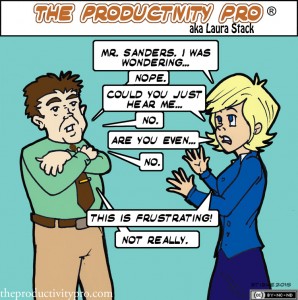 Do you have a coworker who says “no” to your ideas before he or she has given them a decent hearing? For whatever reason, some individuals always have to say “no” before they can see clear to even considering something new. These “no men” (gender neutral) are more annoying and useless, at least in the short term, than “yes men”—and that’s really saying something. I call them “autonegatives.” These people love to criticize and tear down ideas before they’ve given them any real thought.
Do you have a coworker who says “no” to your ideas before he or she has given them a decent hearing? For whatever reason, some individuals always have to say “no” before they can see clear to even considering something new. These “no men” (gender neutral) are more annoying and useless, at least in the short term, than “yes men”—and that’s really saying something. I call them “autonegatives.” These people love to criticize and tear down ideas before they’ve given them any real thought.
Autonegatives live everywhere in life. Some may be masquerading as your friends or family. Sometimes you run into them in shops (though the smart manager doesn’t leave them in place long). At work, the fiefdom builders and information hoarders tend to be autonegatives, some because they like the tiny thrill of power it gives them. Others misinterpret their directives or job descriptions. Some are simply lazy and have taken the “just say no” (intended for when you need to protect yourself from overwork) a little too far.
Sometimes the only way to distinguish an autonegative from someone genuinely trying to help lies in the accumulation of experience. Helpful people won’t always say “no” first. Autonegatives usually will. They do themselves no favors by doing so, especially if their coworkers and leader fall into the can-do type. Eventually, their behavior may lead to their dismissal, a relatively painless process in the current “at-will” workplace—at least for the organization.
Take care, however, not to assume someone is an autonegative just because they bring up an idea’s problems or shortcomings; they may have tried it already, and found it didn’t work. Then again, something that didn’t work a few years ago might today, if technology has caught up with it or the environment has changed; so even then, take “no” with a grain of salt.
Meanwhile, you can deal with autonegatives (to the extent it’s possible) by distancing yourself from and working around them. In meetings, you can ask the listeners to hold their criticisms until the end of your presentation, and then to back up those criticism instead of just saying it can’t be done. This works best when you’re the team lead, but anyone can politely ask his or her coworkers to hold off for a moment.
If others consider you relentlessly negative, stop and think before you say “no” to your coworkers next time. They may have a point, especially if the negative pops out automatically. If the request or idea deserves criticism or refusal, wait until they’re done and explain why. Offer a solution. If you have no reason why something won’t work, hold your tongue.
I have no problem with someone playing the devil’s advocate when the role fits, but your coworkers need someone to help get the job done—not a negatron.
© 2015 Laura Stack. Laura Stack, a.k.a. The Productivity Pro®, helps professionals achieve Maximum Results in Minimum Time®. For nearly 25 years, her keynote speeches and workshops have helped professionals and leaders boost personal and team productivity, increase results, and save time at work. Laura is the author of seven books by large publishers. Her newest book, Doing the Right Things Right: How the Effective Executive Spends Time, hits bookstores in January. Widely regarded as one of the leading experts in the field of performance and workplace issues, Laura has been featured in the Wall Street Journal, the New York Times, and USA Today. Connect via her website, Facebook, or Twitter.



Meet the autonegative with the word “and” and a pause after a negative comment. In a group, others may step in and present another view.
Great strategy! Thanks for sharing this great tip Mark!